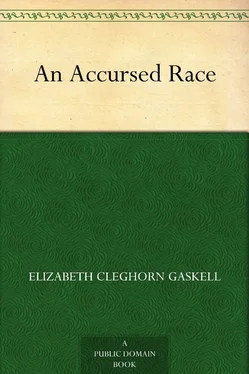Elizabeth Gaskell - An Accursed Race
Здесь есть возможность читать онлайн «Elizabeth Gaskell - An Accursed Race» весь текст электронной книги совершенно бесплатно (целиком полную версию без сокращений). В некоторых случаях можно слушать аудио, скачать через торрент в формате fb2 и присутствует краткое содержание. Год выпуска: 2007, ISBN: 2007, Издательство: Dodo Press, Жанр: Классическая проза, на английском языке. Описание произведения, (предисловие) а так же отзывы посетителей доступны на портале библиотеки ЛибКат.
- Название:An Accursed Race
- Автор:
- Издательство:Dodo Press
- Жанр:
- Год:2007
- ISBN:9781406527933
- Рейтинг книги:3 / 5. Голосов: 1
-
Избранное:Добавить в избранное
- Отзывы:
-
Ваша оценка:
- 60
- 1
- 2
- 3
- 4
- 5
An Accursed Race: краткое содержание, описание и аннотация
Предлагаем к чтению аннотацию, описание, краткое содержание или предисловие (зависит от того, что написал сам автор книги «An Accursed Race»). Если вы не нашли необходимую информацию о книге — напишите в комментариях, мы постараемся отыскать её.
An Accursed Race — читать онлайн бесплатно полную книгу (весь текст) целиком
Ниже представлен текст книги, разбитый по страницам. Система сохранения места последней прочитанной страницы, позволяет с удобством читать онлайн бесплатно книгу «An Accursed Race», без необходимости каждый раз заново искать на чём Вы остановились. Поставьте закладку, и сможете в любой момент перейти на страницу, на которой закончили чтение.
Интервал:
Закладка:
When the Cagot died, he was interred apart, in a plot burying-ground on the north side of the cemetery. Under such laws and prescriptions as I have described, it is no wonder that he was generally too poor to have much property for his children to inherit; but certain descriptions of it were forfeited to the commune. The only possession which all who were not of his own race refused to touch, was his furniture. That was tainted, infectious, unclean-fit for none but Cagots.
When such were, for at least three centuries, the prevalent usages and opinions with regard to this oppressed race, it is not surprising that we read of occasional outbursts of ferocious violence on their part. In the Basses-Pyrenees, for instance it is only about a hundred years since, that the Cagots of Rehouilhes rose up against the inhabitants of the neighbouring town of Lourdes, and got the better of them, by their magical powers as it is said. The people of Lourdes were conquered and slain, and their ghastly, bloody heads served the triumphant Cagots for balls to play at ninepins with! The local parliaments had begun, by this time, to perceive how oppressive was the ban of public opinion under which the Cagots lay, and were not inclined to enforce too severe a punishment. Accordingly, the decree of the parliament of Toulouse condemned only the leading Cagots concerned in this affray to be put to death, and that henceforward and for ever no Cagot was to be permitted to enter the town of Lourdes by any gate but that called Capdet-pourtet: they were only to be allowed to walk under the rain-gutters, and neither to sit, eat, nor drink in the town. If they failed in observing any of these rules, the parliament decreed, in the spirit of Shylock, that the disobedient Cagots should have two strips of flesh, weighing never more than two ounces a-piece, cut out from each side of their spines.
In the fourteenth, fifteenth, and sixteenth centuries it was considered no more a crime to kill a Cagot than to destroy obnoxious vermin. A "nest of Cagots," as the old accounts phrase it, had assembled in a deserted castle of Mauvezin, about the year sixteen hundred; and, certainly, they made themselves not very agreeable neighbours, as they seemed to enjoy their reputation of magicians; and, by some acoustic secrets which were known to them, all sorts of moanings and groanings were heard in the neighbouring forests, very much to the alarm of the good people of the pure race; who could not cut off a withered branch for firewood, but some unearthly sound seemed to fill the air, nor drink water which was not poisoned, because the Cagots would persist in filling their pitchers at the same running stream. Added to these grievances, the various pilferings perpetually going on in the neighbourhood made the inhabitants of the adjacent towns and hamlets believe that they had a very sufficient cause for wishing to murder all the Cagots in the Chateau de Mauvezin. But it was surrounded by a moat, and only accessible by a drawbridge; besides which, the Cagots were fierce and vigilant. Some one, however, proposed to get into their confidence; and for this purpose he pretended to fall ill close to their path, so that on returning to their stronghold they perceived him, and took him in, restored him to health, and made a friend of him. One day, when they were all playing at ninepins in the woods, their treacherous friend left the party on pretence of being thirsty, and went back into the castle, drawing up the bridge after he had passed over it, and so cutting off their means of escape into safety. Them, going up to the highest part of the castle, he blew a horn, and the pure race, who were lying in wait on the watch for some such signal, fell upon the Cagots at their games, and slew them all. For this murder I find no punishment decreed in the parliament of Toulouse, or elsewhere.
As any intermarriage with the pure race was strictly forbidden, and as there were books kept in every commune in which the names and habitations of the reputed Cagots were written, these unfortunate people had no hope of ever becoming blended with the rest of the population. Did a Cagot marriage take place, the couple were serenaded with satirical songs. They also had minstrels, and many of their romances are still current in Brittany; but they did not attempt to make any reprisals of satire or abuse. Their disposition was amiable, and their intelligence great. Indeed, it required both these qualities, and their great love of mechanical labour, to make their lives tolerable.
At last, they began to petition that they might receive some protection from the laws; and, towards the end of the seventeenth century, the judicial power took their side. But they gained little by this. Law could not prevail against custom: and, in the ten or twenty years just preceding the first French revolution, the prejudice in France against the Cagots amounted to fierce and positive abhorrence.
At the beginning of the sixteenth century, the Cagots of Navarre complained to the Pope, that they were excluded from the fellowship of men, and accursed by the Church, because their ancestors had given help to a certain Count Raymond of Toulouse in his revolt against the Holy See. They entreated his holiness not to visit upon them the sins of their fathers. The Pope issued a bull on the thirteenth of May, fifteen hundred and fifteen-ordering them to be well-treated and to be admitted to the same privileges as other men. He charged Don Juan de Santa Maria of Pampeluna to see to the execution of this bull. But Don Juan was slow to help, and the poor Spanish Cagots grew impatient, and resolved to try the secular power. They accordingly applied to the Cortes of Navarre, and were opposed on a variety of grounds. First, it was stated that their ancestors had had nothing to do with Raymond Count of Toulouse, or with any such knightly personage; that they were in fact descendants of Gehazi, servant of Elisha (second book of Kings, fifth chapter, twenty- seventh verse), who had been accursed by his master for his fraud upon Naaman, and doomed, he and his descendants, to be lepers for evermore. Name, Cagots or Gahets; Gahets, Gehazites. What can be more clear? And if that is not enough, and you tell us that the Cagots are not lepers now; we reply that there are two kinds of leprosy, one perceptible and the other imperceptible, even to the person suffering from it. Besides, it is the country talk, that where the Cagot treads, the grass withers, proving the unnatural heat of his body. Many credible and trustworthy witnesses will also tell you that, if a Cagot holds a freshly-gathered apple in his hand, it will shrivel and wither up in an hour's time as much as if it had been kept for a whole winter in a dry room. They are born with tails; although the parents are cunning enough to pinch them off immediately. Do you doubt this? If it is not true, why do the children of the pure race delight in sewing on sheep's tails to the dress of any Cagot who is so absorbed in his work as not to perceive them? And their bodily smell is so horrible and detestable that it shows that they must be heretics of some vile and pernicious description, for do we not read of the incense of good workers, and the fragrance of holiness?"
Such were literally the arguments by which the Cagots were thrown back into a worse position than ever, as far as regarded their rights as citizens. The Pope insisted that they should receive all their ecclesiastical privileges. The Spanish priests said nothing; but tacitly refused to allow the Cagots to mingle with the rest of the faithful, either dead or alive. The accursed race obtained laws in their favour from the Emperor Charles the Fifth; which, however, there was no one to carry into effect. As a sort of revenge for their want of submission, and for their impertinence in daring to complain, their tools were all taken away from them by the local authorities: an old man and all his family died of starvation, being no longer allowed to fish.
Читать дальшеИнтервал:
Закладка:
Похожие книги на «An Accursed Race»
Представляем Вашему вниманию похожие книги на «An Accursed Race» списком для выбора. Мы отобрали схожую по названию и смыслу литературу в надежде предоставить читателям больше вариантов отыскать новые, интересные, ещё непрочитанные произведения.
Обсуждение, отзывы о книге «An Accursed Race» и просто собственные мнения читателей. Оставьте ваши комментарии, напишите, что Вы думаете о произведении, его смысле или главных героях. Укажите что конкретно понравилось, а что нет, и почему Вы так считаете.












